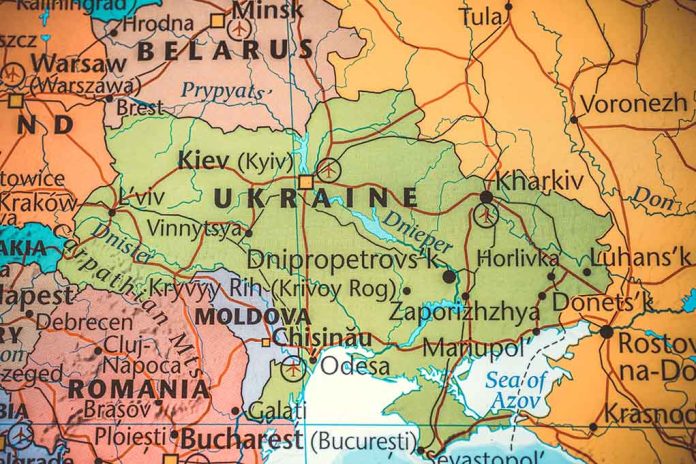
Russia’s crushing blow to international human rights monitoring exposes Putin’s latest effort to silence critics as his government banishes Amnesty International and threatens those who associate with the group with criminal prosecution.
Key Takeaways
- Russian authorities have formally banned Amnesty International by declaring it an “undesirable organization,” making any association with the group a criminal offense
- The Kremlin accused the human rights organization of being a hub of “Russophobia” and supporting Ukraine against Russian interests
- This ban is part of a broader crackdown on dissent that has intensified since Russia’s invasion of Ukraine in February 2022
- Under Russia’s 2015 law, individuals collaborating with “undesirable” organizations can face substantial fines or imprisonment
Putin’s Regime Expands Crackdown on International Oversight
The Russian government has formally outlawed Amnesty International, one of the world’s most respected human rights organizations, by designating it as an “undesirable organization.” This designation effectively criminalizes any association with the group under a 2015 law designed to purge Russia of foreign influence. The ban represents a significant escalation in President Vladimir Putin’s ongoing campaign to eliminate independent voices that might criticize his government’s actions, particularly regarding the Ukraine conflict.
“RUSSIAN AUTHORITIES HAVE OUTLAWED AMNESTY INTERNATIONAL AS AN ‘UNDESIRABLE ORGANIZATION,’ A LABEL THAT UNDER A 2015 LAW MAKES INVOLVEMENT WITH SUCH ORGANIZATIONS A CRIMINAL OFFENSE.” Russian Prosecutor General’s office
The decision, announced by the Russian Prosecutor General’s office in an online statement, accuses Amnesty International of actively working against Russian interests while supporting Ukraine. Russians who continue working with or supporting Amnesty International now risk criminal prosecution, including potential prison sentences. This aggressive stance against international monitoring organizations reflects Putin’s determination to control the narrative about his government’s actions both domestically and abroad.
Claims of “Russophobia” Mask Real Intentions
Russian officials didn’t mince words when explaining their rationale for banning Amnesty International. The Kremlin’s accusations paint the human rights organization as being actively hostile to Russian interests and complicit in supporting what they characterize as Ukrainian extremism. These claims align with Putin’s broader strategy of portraying Russia as a victim of Western bias rather than acknowledging legitimate criticism of his government’s human rights record.
“Russia on Monday labelled Amnesty International an ‘undesirable organisation’, banning the rights group’s activities and accusing it of being a hub of ‘Russophobia’ and of supporting Ukraine.”
“Russia’s Prosecutor General accused the London-headquartered body of being a “centre for the preparation of global Russophobic projects, paid for by accomplices of the Kyiv regime.” stated Russia’s Prosecutor General.
Part of a Broader Pattern of Suppression
The targeting of Amnesty International isn’t an isolated incident but rather part of a systematic effort to eliminate independent voices within Russia. Since the February 2022 invasion of Ukraine, Putin’s government has dramatically accelerated its crackdown on journalists, activists, and organizations that challenge the Kremlin’s narratives. This intensification reflects the regime’s heightened sensitivity to criticism during wartime and its determination to prevent internal dissent from undermining its military objectives.
Amnesty International has been particularly outspoken about the deteriorating human rights situation inside Russia. The organization has documented numerous abuses, ranging from the persecution of religious minorities to the targeting of LGBTQ individuals and the systematic dismantling of free expression rights. These criticisms struck a nerve with the Putin regime, which has now moved to completely silence this international observer within Russian borders.
“The rights to freedom of expression, peaceful assembly and association remained severely restricted,” it adds, detailing “arbitrary persecution” of religious groups, children and LGBTQ groups, among others.” Amnesty
Implications for Russian Citizens and Global Oversight
For ordinary Russians, the ban on Amnesty International represents yet another contraction of their access to independent information and their ability to advocate for their rights. The designation of the organization as “undesirable” means that individuals who continue to work with or support Amnesty could face significant financial penalties or imprisonment. This creates a chilling effect that extends far beyond the organization itself, discouraging Russians from engaging with any international entities that might be critical of the government.
From a global perspective, Russia’s decision further isolates the country from international human rights frameworks and accountability mechanisms. By systematically removing independent observers and criminalizing their activities, Putin’s government is creating an information vacuum where abuses can occur without documentation or consequences. This represents a significant challenge for the international community’s ability to accurately assess and respond to human rights conditions inside Russia.



